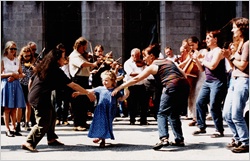This is a past event
NAFCo 2006
The second NAFCo took place at the Elphinstone Institute, Univeristy of Aberdeen, from 26-30 July 2006.
Click here to download an archived copy of the event's 2006 website.
North Atlantic Fiddle Convention, 2006
At the heart of the NAFCo idea is the synergy created by the combination of an academic conference and a performance celebration. The 2006 theme of Connecting Cultures in tradition provided a unique forum for papers on the role of the fiddler (or dancer), musical interplay with dance, socialization and competition, leadership and transmission, tradition and innovation, and cross-cultural relationships. We were privileged to be addressed by four eminent keynote speakers.

Dr Alan Jabbour is former Head of the American Folklife Center at the Library of Congress, a position he held from 1976 to 1999. In ‘Fiddle Tunes of the Old Frontier’, Dr Jabbour spoke about the relationship between Old World and New World fiddle traditions, advancing the proposition that all the modern regional fiddle traditions of the English-speaking world are cultural cousins – born of a wider revolution in instrumental music and dance in the last half of the eighteenth century – a revolution for which the democratized Italian violin was the central catalyzing instrument.
Professor Colin Quigley, then of the World Arts and Cultures Department at the University of California at Los Angeles, has researched the inter-relationship of fiddle music and dance in Newfoundland and Eastern Europe. In ‘Dancing Bows and Musical Feet’, he considered rhythm as the most defining characteristic of local and regional style in fiddling around the North Atlantic, and especially within Canada where so much melodic material is widely shared.

Professor Mícheál Ó Súilleabháin, Director of the Irish World Music Centre at the University of Limerick, is both an outstanding performer and a respected scholar. He discussed the remarkable fiddle traditions upheld by Gypsy Travellers in Ireland, most notably the fiddler Tommie Potts (1912-1988), with whom he undertook fieldwork.
Dr Peter Cooke, formerly of the School of Scottish Studies and the Department of Music at Edinburgh University, is an eminent ethnomusicologist whose research areas include both Scotland and West Africa. Dr Cooke revisited his groundbreaking study of the Shetland tradition and the world of fiddle music he encountered there when he undertook his fieldwork between 1970 and 1980.
One of the great strengths of NAFCo is that it draws on scholars who are also fine performers, as is Mícheál Ó Súilleabháin. This is also true of Alan Jabbour, who is a wonderful ‘Old Time’ fiddler, in the style of the Upper South, who learnt from musicians like Henry Reed of Glen Lyn, Virginia, and Tommy Jarrell of Toast, North Carolina. Other performer/scholars who offered papers include Richard Blaustein of East Tennessee State University, Matt Cranitch and Mats Melin of the University of Limerick, Katherine Campbell of the University of Edinburgh, Catriona Macdonald and Kathryn Tickell of the University of Newcastle, Kimberly Fraser of Saint Francis Xavier University, Nova Scotia, Karin Eriksson and Mats Nilsson of the University of Gothenburg, Sherry Johnson of York University, Toronto, Gaila Kirdiene of the Lithuanian Academy of Music and Theatre, and Mary Anne Alburger of the Elphinstone Institute.

